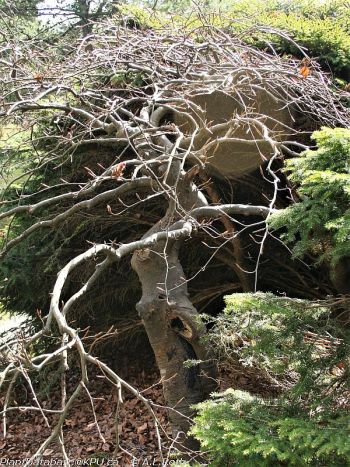Scientific Name:
Fagus sylvatica
'Purpurea Pendula'
Pronunciation:
FAY-gus sil-VAT-ih-kuh
Common Name:
weeping copper beech
Family Name:
Fagaceae
Plant Type:
Tree - deciduous
Key ID Features:
Grafted with pendulous branches (form is umbrella or mushroom-like); leaves emerge purple in spring, fading to green-purple in summer. Leaves alternate, ovate-elliptic with undulating margin and prominent veins. Winter ID: weeping form; bark smooth, silver-grey, with a horizontal pattern (like an elephant's leg); buds narrowly conical, most 1-2.5cm long x 4-5mm wide, pointed, spear-like, divergent, reddish-brown with grey fuzz.
Habit:
Dense, Pendulous
Form:
Weeping
Texture:
Medium
Mature Height:
2 - 3m
Mature Spread:
2 - 3m
Growth Rate:
Slow
Origin:
Europe, Garden origin
Hardiness Rating:
Zone 5: (-29 to -23 °C)
Exposure:
Full sun, Part sun/part shade
Soil/Growing Medium:
Rocky or gravelly or dry, Well-drained
Water Use:
Moderate
Landscape Uses:
Accent plant, Small garden/space, Specimen plant
Additional Info:
Leaf Morphology:
Form:
Simple
Arrangement:
Alternate
Texture/Venation:
Soft flexible, Heavily veined, Pinnate venation
Surfaces:
Lustrous
Colour in Summer:
Dark-red
Colour in Fall:
Brown
Shapes:
Elliptic, Ovate
Apices:
Acute
Bases:
Acute
Margins:
Ciliate, Undulate (wavy)
Bark Morphology:
Smooth
Bark or Stem Colour:
Grey, Brown
Leaf Bud Type:
Narrowly conical
Leaf Scar Shape:
Half-round
Organ Modifications:
Ectomycorrhizae
Propagation:
Greenwood cuttings, Grafting
Maintenance:
Low
Pest Susceptibility:
Aphids, Canker or sap rot, Mildew (Pest resistant, Disease resistant, Deer resistant, Drought tolerant)
Specific Pests:
eech scale is an occasional problem. Watch for aphids, Japanese beetles and caterpillars. Distressed trees may be attacked by borers. Beech bark disease, canker and powdery mildew
Course(s):
- not used (off campus)
Location(s):
- (NCA) Not Currently Available : not used
- (SGL) Sendell Gardens, Langley





